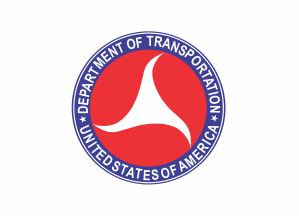United States Department of Transportation
United States Department of Transportation (USDOT or DOT) is a federal government agency of the United States responsible for regulating and overseeing transportation systems across the country to ensure the safety and efficiency of both people and goods. Established by an act of Congress on October 15, 1966, the department officially began its operations on April 1, 1967. The DOT is headed by the Secretary of Transportation, who is a member of the Cabinet of the United States and is appointed by the President of the United States, subject to confirmation by the United States Senate.
History[edit | edit source]
The creation of the DOT was a response to the growing complexity and demands of the nation's transportation system in the mid-20th century. Before its establishment, responsibilities for transportation were scattered across various government agencies, leading to a lack of coordination and inefficiency. The DOT consolidated these responsibilities to provide a more cohesive approach to transportation policy and regulation.
Structure[edit | edit source]
The DOT oversees several administrations that specialize in different modes of transportation:
- Federal Aviation Administration (FAA) - oversees civil aviation
- Federal Highway Administration (FHWA) - manages the nation's highways
- Federal Railroad Administration (FRA) - regulates and promotes safe and efficient railroads
- Federal Transit Administration (FTA) - supports public transportation systems
- Maritime Administration (MARAD) - deals with America's maritime interests
- National Highway Traffic Safety Administration (NHTSA) - focuses on vehicle safety
- Pipeline and Hazardous Materials Safety Administration (PHMSA) - regulates pipeline transportation and hazardous materials
- Saint Lawrence Seaway Development Corporation (SLSDC) - operates and maintains the U.S. portion of the Saint Lawrence Seaway
Functions[edit | edit source]
The DOT has a broad range of responsibilities, including:
- Formulating national transportation policy and promoting intermodal transportation
- Negotiating and implementing international transportation agreements
- Administering financial programs to support transportation infrastructure
- Setting safety regulations and standards for all major modes of transportation
- Conducting research and development in transportation
Impact[edit | edit source]
The DOT plays a crucial role in shaping the transportation landscape of the United States. Its policies and regulations affect the economy, the environment, and the daily lives of all Americans. By working to improve the safety and efficiency of the transportation system, the DOT contributes to the nation's growth and competitiveness.
Challenges[edit | edit source]
The department faces ongoing challenges such as adapting to technological advancements, improving infrastructure resilience, reducing transportation-related emissions, and ensuring equitable access to transportation for all Americans.
See Also[edit | edit source]
- Transportation in the United States
- Infrastructure of the United States
- Environmental policy of the United States
This article is a government-related stub. You can help WikiMD by expanding it!
Search WikiMD
Ad.Tired of being Overweight? Try W8MD's NYC physician weight loss.
Semaglutide (Ozempic / Wegovy and Tirzepatide (Mounjaro / Zepbound) available. Call 718 946 5500.
Advertise on WikiMD
|
WikiMD's Wellness Encyclopedia |
| Let Food Be Thy Medicine Medicine Thy Food - Hippocrates |
Translate this page: - East Asian
中文,
日本,
한국어,
South Asian
हिन्दी,
தமிழ்,
తెలుగు,
Urdu,
ಕನ್ನಡ,
Southeast Asian
Indonesian,
Vietnamese,
Thai,
မြန်မာဘာသာ,
বাংলা
European
español,
Deutsch,
français,
Greek,
português do Brasil,
polski,
română,
русский,
Nederlands,
norsk,
svenska,
suomi,
Italian
Middle Eastern & African
عربى,
Turkish,
Persian,
Hebrew,
Afrikaans,
isiZulu,
Kiswahili,
Other
Bulgarian,
Hungarian,
Czech,
Swedish,
മലയാളം,
मराठी,
ਪੰਜਾਬੀ,
ગુજરાતી,
Portuguese,
Ukrainian
Medical Disclaimer: WikiMD is not a substitute for professional medical advice. The information on WikiMD is provided as an information resource only, may be incorrect, outdated or misleading, and is not to be used or relied on for any diagnostic or treatment purposes. Please consult your health care provider before making any healthcare decisions or for guidance about a specific medical condition. WikiMD expressly disclaims responsibility, and shall have no liability, for any damages, loss, injury, or liability whatsoever suffered as a result of your reliance on the information contained in this site. By visiting this site you agree to the foregoing terms and conditions, which may from time to time be changed or supplemented by WikiMD. If you do not agree to the foregoing terms and conditions, you should not enter or use this site. See full disclaimer.
Credits:Most images are courtesy of Wikimedia commons, and templates, categories Wikipedia, licensed under CC BY SA or similar.
Contributors: Prab R. Tumpati, MD


